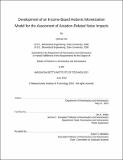Development of an income-based hedonic monetization model for the assessment of aviation-related noise impacts
Author(s)
He, Qinxian, Ph. D. Massachusetts Institute of Technology
DownloadFull printable version (1.995Mb)
Other Contributors
Massachusetts Institute of Technology. Dept. of Aeronautics and Astronautics.
Advisor
Ian A. Waitz.
Terms of use
Metadata
Show full item recordAbstract
Aviation is an industry that has seen tremendous growth in the last several decades. With demand for aviation projected to rise at an annual rate of 5% over the next 20 to 25 years, it is important to consider technological, operational, and policy changes that can help accommodate the forecasted growth while minimizing detrimental effects to the environment, which include aircraft noise, air quality degradation, and climate change. This thesis presents a new method to quantify the monetary impacts of aviation-related noise, which are of particular interest to policymakers and other aviation stakeholders for the evaluation of policy options and tradeoffs. Previous studies on the monetization of aviation noise impacts typically used the hedonic pricing method to estimate noise-induced property value depreciation. However, this approach requires detailed data on local real estate markets, which are not readily available at a fine resolution for many airports regions around the world. The new monetization model developed in this thesis is based on city-level personal income, which is often more widely available than real estate data. At the core of the approach is a meta-analysis of 60 hedonic pricing noise studies from North America, Europe, and Australia, which was used to derive a general relationship between average personal income and the Willingness to Pay (WTP) for noise abatement by means of a multivariate regression analysis. Several explanatory variables were introduced, and a backward selection procedure was used so that the final regression contained only parameters that have a significant effect on WTP. The resulting model expressed WTP for noise abatement as a function of the city-level average personal income and an interaction term, which is the product of the income and a dummy variable for non-US airports. Applying the new model to income data, noise contours, and population data for 178 airports worldwide, the global capitalized monetary impacts of commercial aviation noise in 2005 were estimated to be $25.0 billion, with a standard deviation of $2.2 billion. Comparison with previous results yielded a difference of less than 17%, demonstrating convergent validity of the new model. Uncertainty assessment of the income-based model was conducted in order to understand the sources of uncertainty and how they may limit the model's functionality and applicability. Monte Carlo Simulations were used to explicitly quantify the propagation of uncertainties. Local, global, and distributional sensitivity analyses were also performed to investigate how each model input contributes to output variability, and to prioritize the inputs on which future research should be directed. The results suggested that further research should be conducted to expand the meta-analysis data set, with a particular emphasis on low-income nations where few noise studies currently exist. A more comprehensive meta-analysis data set would elucidate the relationship between income and WTP for noise abatement, thereby reduce epistemic uncertainty and broaden model applicability.
Description
Thesis (S.M.)--Massachusetts Institute of Technology, Dept. of Aeronautics and Astronautics, 2010. This electronic version was submitted by the student author. The certified thesis is available in the Institute Archives and Special Collections. Cataloged from student submitted PDF version of thesis. Includes bibliographical references (p. 119-127).
Date issued
2010Department
Massachusetts Institute of Technology. Department of Aeronautics and AstronauticsPublisher
Massachusetts Institute of Technology
Keywords
Aeronautics and Astronautics.